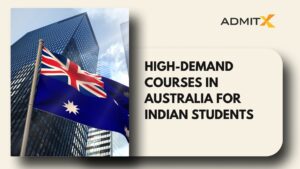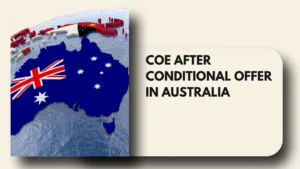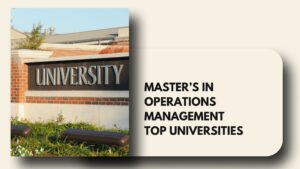- Graduates earn salaries ranging from $60,000 to $200,000, with career opportunities in investment banking, risk management, and consulting.
- Demand for finance professionals is growing by 11% by 2026, making Master’s in Finance courses more valuable than ever.
- Top-ranked universities like HEC Paris, Oxford, and MIT Sloan offer globally recognized Master’s in Finance programs with durations of 9–24 months.
- Why Choose a Master’s in Finance?
- Why Choose a Master’s in Finance?
- Top Universities for a Master’s in Finance
- Scholarships For MS In Finance Abroad
- What You’ll Study in a Master’s in Finance
- Key Subjects and Skill Development
- Documents Required For Pursuing Master’s in Finance
- Applying for a Master’s in Finance: A Step-by-Step Guide
- Key Takeaways By AdmitX
- FAQs

Why Choose a Master’s in Finance?
If you’re looking to build a career in finance, this degree gives you more than just academic knowledge. Here’s why thousands of students choose it every year:
- High demand and competitive salaries worldwide.
- Hands-on learning in investment, corporate finance, and risk management.
- Access to global networks and internships.
- Skills that employers in every industry value.
| University | Course | Duration | Tuition Fees |
|---|---|---|---|
| HEC Paris | Master in International Finance | 10 months | € 43,000 |
| ESCP Business School | MSc in Finance | 15 months | €17,200 |
| Warwick Business School | MSc in Finance | 12 months | £43,830 |
| Emylon Business School | Master in Finance | 24 months | €39,990 |
| Skema Business School | MSc Financial Market & Investment | 24 months | €46 000 |
| The University Of Chicago Booth Business School | Master in Finance | 15 months | $86,250 |
Why Choose a Master’s in Finance?
If you’re looking to build a career in finance, this degree gives you more than just academic knowledge. Here’s why thousands of students choose it every year:
- High demand and competitive salaries worldwide.
- Hands-on learning in investment, corporate finance, and risk management.
- Access to global networks and internships.
- Skills that employers in every industry value.
Top Universities for a Master’s in Finance
Choosing the right university shapes your experience and career path. Below are the top-ranked institutions offering Master’s in Finance courses with details on course duration and fees.
| University | QS Business Masters Rankings 2024 | Course | Duration | Tuition Fee |
|---|---|---|---|---|
| HEC Paris | 1 | Master in International Finance | 10 months | €43,800 |
| Oxford | 1 | MSc Financial Economics | 9 months | £55,630 |
| London Business School | 3 | MSc in Financial Analysis | 16 months | £47,500 |
| MIT (Sloan) | 4 | Master of Finance | 12 months | $91,250 |
| UC Berkeley (Hass) | 5 | Master of Financial Engineering | 1 Year | $82,901 |
| Cambridge (Judge) | 6 | Master of Finance | 1 Year | £55,080 |
| ESSEC Business School | 7 | Masters in Finance | 1-2 Year | €55,000 |
| London School Of Economics | 8 | MSc Finance | 10 months | £44,928 |
| UCLA (Anderson) | 9 | Master of Financial Engineering | 15 months | $93,120 |
| Bocconi University | 10 | MSc in Finance | 2 Years | €18,000 |
Scholarships For MS In Finance Abroad
For students interested in Master’s in Accounting and Finance or related fields, scholarships can make education more accessible and provide substantial financial support for students. These grants help cover tuition costs and are granted to eligible students. Here are a few scholarships:
| Scholarship | Country | Eligibility | Amount |
|---|---|---|---|
| UNIL Master’s Grants | Switzerland | Not previously enrolled at UNIL Bachelor's degree from a top university B2 level proficiency in French or English | Monthly stipend of USD 1594.69 |
| Hani Zeini Scholarship | USA | Enrolled in an accredited college or university 850-word essay on 21st-century business challenges | USD 1,000 |
| Chevening Scholarships | UK | Citizen of a Chevening-eligible country 2 years of work experience | USD 21,964 |
What You’ll Study in a Master’s in Finance
Program Duration
Most Master’s in Finance courses take 1–2 years to complete.
Core Courses
- Investment
- Financial Planning
- Insurance & Risk
- Commercial Banking
- Trading & Markets
- The Future of Finance
Specializations
- Asset Management
- International Finance
- Financial Management
- Financial Engineering
- Financial Markets
Key Subjects and Skill Development
In addition to core courses, students delve into specialised subjects such as:
Subjects
- Quantitative Methods (math & statistics for finance)
- Portfolio Management (managing investments for clients or firms)
- Managerial Economics (decision-making in businesses)
- Computational Finance (using technology in finance)
- Private Equity (investing in private companies)
Professional Skills
- Analyze and value companies effectively
- Manage risks in financial portfolios.
- Build corporate finance strategies.
- Understand investment banking operations.
- Use data and financial models to make smart decisions.
| Job Post | Average Salary (Per Annum) |
|---|---|
| Financial Services Sales Agent | $55,000-87,000 |
| Risk Analyst | $63,000-1,00,000 |
| Financial Consultant | $72,000-1,00,000 |
| Investment Analyst | $87,000-2,00,000 |
| Investment Banking Analyst | $95,000-2,00,000 |
| Management Consultant | $95,000-2,00,000 |
Documents Required For Pursuing Master’s in Finance
- To study abroad, you need to prepare a few key documents. Make sure you have these ready:
- Academic transcripts from previous education.
GRE or GMAT test scores (if required). - TOEFL or IELTS English proficiency scores.
- Letters of recommendation (from professors or employers).
- Resume or CV with your education and experience.
- Statement of Purpose explaining your goals.
- Valid passport and student visa.
Applying for a Master’s in Finance: A Step-by-Step Guide
Applying to study abroad may feel overwhelming at first, but breaking it into clear steps makes it manageable. Below is a detailed guide to help you through each stage of your application journey.
Step 1: Research Programs
Look for universities and programs that fit your career goals, budget, and location preferences. Check rankings, course content, tuition fees, and visa options.
Step 2: Check Eligibility
Most programs require:
- A bachelor’s degree in finance, business, or a related field.
Minimum GPA (varies by university). - GRE/GMAT scores (sometimes optional).
- English proficiency test (TOEFL/IELTS/PTE).
Step 3: Prepare Documents
You’ll need:
- Academic transcripts.
- Test scores (GRE/GMAT, TOEFL/IELTS).
- Letters of recommendation.
- Resume/CV.
- Statement of Purpose (SOP).
- Valid passport.
Step 4: Submit Applications
Apply through each university’s online portal. Fill in the forms, upload your documents, pay the application fee, and submit before the deadline.
Step 5: Interview & Offer
Some universities may interview you to assess your goals and fit. If accepted, you’ll receive an offer letter. You can review and accept it by paying the deposit.
Step 6: Student Visa & Arrival
With your offer letter, apply for a student visa, book accommodation, and arrange travel. Arrive in time for orientation and settle in.
Key Takeaways By AdmitX
Pursuing a Master’s in Finance abroad offers a multitude of benefits, including global exposure, world-class faculty, and bright career prospects. Students gain invaluable networking opportunities and a broader international financial perspective. To maximise the benefits of your program, be sure to actively engage with your professors, participate in extracurricular activities, and seek out internship opportunities.
At AdmitX, we’re here to make your journey smoother and stress-free. We offer ready-to-use samples and step-by-step guides for all essential application documents, including SOPs, resumes, and recommendation letters. So you don’t have to spend time searching online or second-guessing what works.
Get in touch with us today and start your study abroad journey with the right resources and expert support!
FAQs
Which are the top universities for Master’s in Finance courses?
Top universities include HEC Paris, Oxford, MIT Sloan, and London Business School, known for their Master’s in Finance courses and high rankings.
What is the duration of Master’s in Finance courses abroad?
Most Master’s in Finance courses abroad take 1–2 years to complete, depending on the university and specialization.
What is the average Master’s in Finance salary after graduation?
Graduates of MS in Finance courses can earn between $60,000–$200,000 annually, depending on role and location.
Are there scholarships for Master’s in Finance courses?
Yes, scholarships are available to reduce the Master’s in Finance fees and costs, including options like Chevening and UNIL Master’s Grants.
Can I study Master’s in Finance courses without a finance background?
Some universities accept students from related fields like economics or engineering for their Master’s in Finance courses, but a strong quantitative foundation is preferred.
What is the difference between Master’s in Finance and Master’s in Accounting and Finance?
While the Master’s in Finance program focuses on markets, investments, and corporate finance, Master’s in Accounting and Finance includes accounting principles and auditing as well.
Can a Master in Finance boost my salary?
In many cases, a Master’s in Finance can lead to a significant salary increase. This qualification equips you with advanced financial knowledge and skills, making you a more attractive candidate to employers.
How can I finance my master's degree abroad?
Here are some options to consider:
- Scholarships and Grants
- Student Loans
- Savings
- Part-time Work (if permitted)
Is a Masters in Finance a good choice?
Whether a Master’s in Finance is a good choice depends on your individual goals and career aspirations. Here are some factors to consider:
- Career Goals
- Work Experience
- Financial Investment
If you are an aspirant looking to study at your dream university, book an appointment with AdmitX today and start your applications early to avail yourself of all the benefits.

















